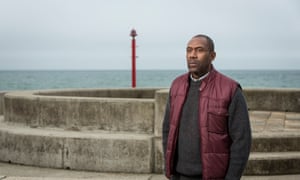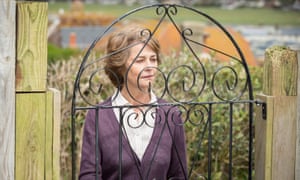• Spoiler alert: this article contains spoilers for all three series of Broadchurch
Four years after we first met west country plumber Mark Latimer, striding to work one sunny morning through greetings from members of what seemed like a friendly community, we saw him for the last time on Monday night. He drove away along the picturesque Dorset clifftops, leaving behind Broadchurch, the fictional town where – across 24 episodes and three series – Latimer had lost his child (killed by a paedophile), his marriage (ruined by mutual recrimination), and almost his life (suicide attempt).
But Latimer – played by Andrew Buchan – had gained a place among the special memories of TV drama. When it launched in 2013, Broadchurch introduced to British TV lessons from Scandi-noir dramas such as The Killing, in which a terrible crime was explored at a very slow pace in an extremely beautiful place. Subsequently, other UK dramas – especially BBC1’s The Missing and ITV’s Unforgotten – learned from Broadchurch the benefits, in screenwriting, of spending more time looking at the map and less at the watch.
It’s unlikely viewers will ever know what happens next to Latimer, or to David Tennant’s DI Alec Hardy and Olivia Colman’s DS Ellie Miller, the tetchy but mutually dependent detectives who, in series one, solved the murder of Latimer’s son and, in the third, caught the rapists of Trish Winterman and other local women. This, the ITV announcer baldly declared, was “the last-ever Broadchurch”. Writer and creator Chris Chibnall had left the smallest possibility in interviews of more episodes one day, but he will be busy for the next few years, running Doctor Who.
If this is the end, then Chibnall has left viewers happy, if that word is appropriate for a show that started with an investigation of a child death and finished with a case involving serial rape. The success of the third run is even more notable after the disaster of the second, when Chibnall unwisely re-examined the original case (focusing on the trial of the man who had confessed to Danny Latimer’s murder), undermining the authority and impact of what had gone before.
The first and last scenes of a drama are the hardest to get right. Botch the beginning and the potential audience gets smaller, but fail to deliver an end that satisfies and the story immediately seems weaker in retrospect. With Broadchurch, it seemed only proper that the show should end with a gruffly chummy scene between Hardy and Miller, sitting on a bench with the spectacular cliffs of Dorset’s Jurassic Coast behind them. Here together were the three elements that have made Broadchurch a landmark. The eye-widening Dorset scenery achieves – in common with the Oxford of Morse and the Sweden of Wallander – the paradox of making you keen to live there, even as the storyline warns of the high risk of dying there.
And the performances of Tennant and Colman were magnetically complementary. There are few completely functional detectives in crime fiction but, even by generic standards, Hardy and Miller are dragging heavy baggage: he has survived a life-threatening illness, while she was married to the paedophile killer they apprehended first time out.

These bleak CVs usefully complicated what could have been a standard hard cop-soft cop, boss-junior combination, in the Morse-Lewis mould. Miller was given the most brutal moment across the three series (almost kicking a suspect to death), while Hardy was occasionally opened to unexpected notes of vulnerability and comedy, especially in scenes with his daughter. Chibnall also deserves cheers for resisting any sentimental logic that the two divorced detectives should get together romantically.
Another advantage of the casting of Tennant and Colman, actors whose talents range from TV comedy to stage tragedy, is that they were able to make sense of the sometimes jerky mood swings of a Broadchurch script. Although Chibnall’s dialogue rarely contains direct jokes, there is some suggestion that he has a dry sense of humour. For instance, episodes regularly ended with a shot of a cliff, which could be a reference to the “cliffhanger” endings; while one suspect’s questionable alibi about having been catching fish was never explained, which may make it a literal example of a red herring clue.
While the show’s look and rhythm looked to Scandinavian models, there were also nods to Agatha Christie and even Midsomer Murders in the use of a tight community in which a multiplicity of residents have something to hide, which may not be to do with the crime under investigation. The local vicar and the newspaper editor sometimes seemed more like the sort of clerics and journalists Miss Marple might have encountered, rather than convincing representatives of the contemporary Church of England or the fourth estate.
In a way that may be Doctor Who’s gain but is certainly crime drama’s loss, Chibnall is deft at the concealed clues on which whodunnits depend. A detail that proved to be crucial to the solution of season three was that the serial rapist attacked only in summer. In a seaside resort such as Broadchurch, this could easily have pointed to seasonal labour, but the criminal turned out to be another kind of intermittent resident: a student, Leo Humphries.
But deceptive developments of the sort that Christie would have admired co-existed with a procedural realism unknown in classic detective fiction. Boldly, this series of Broadchurch was trying to be two things simultaneously: a quasi-documentary presentation of best police practice in the investigation of rape and a top-rating crime drama with the requisite outlandish twists and cliffhangers, in which compromising biographical details or items of abandoned clothing come to light just towards the end of the episode.
Chibnall succeeded in both these aims, but separately. Only intermittently did the lines of public information and crowd-pleasing overlap, as when Trish Winterman’s refusal to name the man with whom she had consensual sex on the day of her rape both thickened the mystery and reflected the legal issue of judging a victim’s prior sex-life.

The one big flaw of this Broadchurch also applied to the first season and afflicts, to some extent, all crime fiction. In the interests of making the puzzle tough to solve – the central pleasure of the genre – the eventual villain often has to be someone whose means and motives have been least clearly shown to the viewer: a detective’s spouse in season one, a largely peripheral guy in a fishing supplies shop on Monday night. The fact that Humphries ranked low in weekend media speculation ahead of the heavily embargoed denouement is a tribute to Chibnall’s plotting, but is also evidence of the way in which detective dramas sometimes have to gain narrative complexity by losing psychological plausibility.
Admittedly, the sick justification given by the multiple rapist – a desire to subjugate and control women – is a recognised psychopathology in such crimes, and reflected the series’ well-developed sub-theme of the effect on young men of the increasing availability and depravity of pornography. But the writer’s need to keep Humphries under the radar of armchair detectives resulted in him being one of the least fully explored and explained characters. The revelation as culprit of Lenry Henry’s Ed Burnett, Charlie Higson’s Ian Winterman or Mark Bazeley’s Jim Atwood might have been more inherently credible.
The presence of Henry and Higson, however, was an example of another of the strengths of Broadchurch: impressive star casting, either as suspects or, in the case of the second season, Charlotte Rampling as a star QC, whose appearance almost justified the silly trial strand. Also to the credit of the third Broadchurch is that, apart from having to overcome its own second series, the show also found itself for the first time up against a BBC rival in top form: Jed Mercurio’s police corruption series Line of Duty.
Until this year, the production schedules of the two mega-hits meant they had always spookily avoided each other: the earlier series of Line of Duty went out in 2012, 2014 and 2016, with the previous seasons of Broadchurch interleaved in the years between. On the evidence of Broadchurch 2 and Line of Duty 3, most would have expected the contest to be handed to Mercurio over Chibnall on an early knockout. But, abutting on Sunday and Monday nights this spring, the two cop shows have fought one of the great heavyweight ratings battles, and seem sure to compete again at TV awards ceremonies.
There will be delight among traditional broadcasters that – despite the increasing success of self-scheduling seasons on Netflix and Amazon Prime – the last series of Broadchurch and the latest of Line of Duty have confirmed the enduring power of weekly serials that millions (up to 10 for Broadchurch, over 7 for Line of Duty) watch at the same time each week, after seven days of wild anticipation and speculation. Broadchurch may be dead, but it has helped old-fashioned TV drama to live longer.